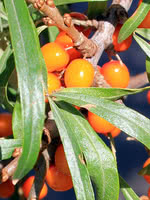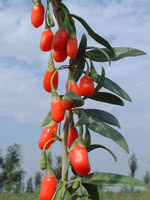Mon-Fri 9am - 5pm Mountain time
Sea Buckthorn (Seaberry) vs Goji Berry
Hippophae rhamnoides l.
Lycium barbarum
NOT AVAILABLE THIS SEASON - MIGHT RETURN
Sea Buckthorn, aka Seaberry, is a nitrogen fixing shrub that produces attractive berries high in vitamin C.
While we can't confirm claims that the berries are effective in treating various ailments, many people believe consuming the berries helps with arthritis, infections, and asthma, among other things.
Sea Buckthorn plants have attractive pale silvery-green leaves, dense branches, and large thorns, people like to grow in ornamental hedges or as a first row in a shelterbelt.
Note: these plants typically reach maturity and make their sex easily known (females producing fruit) in their 3rd or 4th year of growth. Our seedlings are too young to identify their sex.
Goji Berry is a woody, deciduous perennial known for its hearty, bright orange-red berries. It typically produces light lavender flowers from June through September, with fruit maturation taking place between August and October.
Goji Berry berries are delicious, nutrient rich, high in antioxidants, and are often called a super fruit. Many describe their flavour as being like a tart cherry tomato.
Sea Buckthorn (Seaberry) Quick Facts
Goji Berry Quick Facts
In row spacing: 0.9 - 1.2 m (3 - 4 ft)

